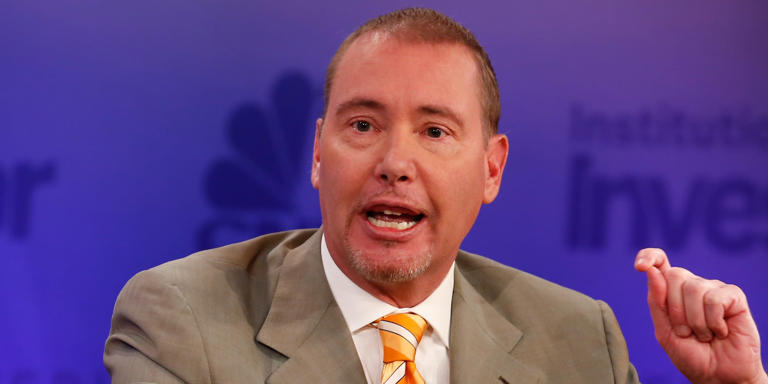Key Takeaways:
- Jeffrey Gundlach, CEO of DoubleLine Capital, likened the current surge in AI-driven stocks to the dot-com bubble.
- Gundlach also forecasted persistent inflation and an economic downturn.
- Additionally, market experts Bill Gross and John Hussman expressed concerns about excessively high stock valuations.
- These warnings highlight growing apprehension about the sustainability of the current market rally.
Jeffrey Gundlach, CEO of DoubleLine Capital, raised concerns about the current state of the stock market, drawing comparisons to the dot-com bubble of the late 1990s. He highlighted the significant surge in the Nasdaq index during the fourth quarter of 1999, followed by a substantial decline of 85% within the next 12 months.
Gundlach characterized the current market as “grabby” and momentum-driven, expressing his preference for investing in an equal-weighted index rather than concentrating on a few dominant stocks. He specifically mentioned the “Magnificent Seven,” including companies like Nvidia and Microsoft, which have become disproportionately large components of market cap-weighted indexes such as the S&P 500 and Nasdaq 100.
While acknowledging the profitability of companies like Meta in today’s market, Gundlach emphasized the potential risks associated with rapid and high-flying valuations. He cautioned against aggressive positions in risky assets, citing the significant level of risk present in markets that have experienced such substantial growth.
In addition to concerns about the stock market, Gundlach warned about the impact of potential interest rate cuts, which have contributed to the recent surge in stock prices. He noted that lower interest rates typically stimulate consumer spending and boost corporate profits but expressed concerns about the potential for accelerated inflation, particularly in response to rising crude oil prices.
Gundlach cautioned that if economic growth slows, the Federal Reserve might respond by cutting rates too aggressively, leading to a scenario of “stagflation” characterized by both inflation and economic stagnation. He emphasized the need for caution in navigating the current market environment, highlighting the potential challenges and risks ahead.
Exuberance and bubbles
Bill Gross, renowned bond investor and co-founder of PIMCO, joined Jeffrey Gundlach in expressing concerns about the stretched valuations of the stock market. In an outlook published on Friday, Gross questioned the rationale behind the market trading at record highs despite a significant increase in interest rates over the past two years, which has made safer assets like Treasurys more attractive compared to risky assets such as stocks. He attributed this phenomenon to fiscal deficit spending, enthusiasm for artificial intelligence (AI), and momentum-driven trading, which have fueled what he described as “irrational exuberance” in the markets since 2022.
John Hussman, president of Hussman Investment Trust and a longtime market bear, took a more dire view of the market’s valuation in a research note also published on Friday. He warned that stock valuations have reached extreme levels, comparable to only two previous instances: the day before the market peaked in January 2022, and during the height of the 1929 bubble that preceded the Wall Street Crash and the Great Depression. Hussman characterized the current situation as the “double-top” of the most extreme speculative bubble in US financial history, suggesting heightened risks for investors amidst the market’s exuberance.
